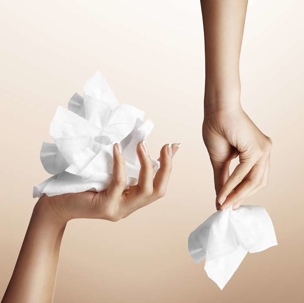When flushable wipes became a quick fix for busy moms, most people got excited. They used them to clean countertops, toilets, babies, and almost anything else that needed cleaning. Little did anyone know the damage that the wipes would have caused.
According to plumbers, those tiny wipes have become a nightmare resulting in millions of dollars in yearly repairs.
Can You Use Wipes as Toilet Paper?
You should never flush wipes down your toilet, even if they’re marketed as “flushable”. Plumbers state that not all wipes are flushable, but that is news to many people. They got sold on flushable wipes, so they kept flushing them. These wipes do not dissolve like toilet paper, and can easily clog your pipes.
According to the Washington Post, Washington D.C. alone spent about $1 million dollars in 2013 trying to tackle the wipes in the sewage system. They clogged up the system and caused water to back up in many homes. On top of that, plumbers state that homeowners also spend thousands of dollars for drain cleaning. Each time the problem gets fixed, it happens all over again because these people are not aware of the problem until the city mentions it. Some of them do not care. They get so used to flushing the wipes that it has become second nature to them.
The following wipes should not get flushed down the toilet:
- Baby wipes
- Body wipes
- Hard surface wipes
- Makeup remover wipes
According to plumbers, the problem is that people are unsure of which wipes to flush. The bathroom wipes should break down like tissue paper, but some people have doubts.
Blockage in Pipes
Plumbers have been reporting that nonwoven cloth wipes have been getting stuck in sewage pipes. With all the oils and other debris, the wipes get caught in the pipes causing blockages. They further reported that this has become a worldwide problem.
There have been reports in the U.S., Toronto, Sydney, London, and other countries. Some people have even filed lawsuits against the companies that make the wipes.
If the material that makes the wipes is durable, chances are, it will clog even more than the other wipes. Paper towels are thick.
That is why plumbers advise people not to flush them. The same argument can get used for the wipes. Some of them are even stronger than paper towels. The flushable wipes will have the same effect.
They are not biodegradable like toilet paper.
Plumbers have reported that even some toilet papers have gotten clogged, but it is not a major problem. They eventually get dissolved. The wipes do not dissolve at all. They get trapped and cause flooding.
Once the wipes get stuck, other debris will latch on to them causing further blockages resulting in drain cleaning and toilet repair.
A Temporary Solution
 Treatment plants in Canada have spent $250 million annually on repairs due to wipes. They have figured out a way to tackle the situation, but there are other problems. The plants have been using large interceptors to trap the wipes, but the wipes remain in the system. They have to get removed and hauled to a landfill. The cost is about $100,000 annually.
Treatment plants in Canada have spent $250 million annually on repairs due to wipes. They have figured out a way to tackle the situation, but there are other problems. The plants have been using large interceptors to trap the wipes, but the wipes remain in the system. They have to get removed and hauled to a landfill. The cost is about $100,000 annually.
The Association of the Nonwoven Fabrics Industry has been working with sewer providers and wipes companies. They came up with a solution to label wipes that should not get flushed. Despite the warning, people still dispose of the wipes in the lavatory resulting in toilet repair.
Plumbers state that even if the wipes are flushable, they should not get flushed. It will help to preserve the environment. Some people disregard the warnings and still flush the wipes. Part of the problem is that some of the wipes do not have the sign prominently placed on them. Consumers then assume that it is okay to flush the wipes.
Some companies state that their products are safe to flush down the toilet, but plumbers disagree. This only creates more problems. People keep flushing the wipes.
The more they flush, the more plumbing repairs get reported. Some argue that it not be a good business practice to claim that something is flushable when that is not the case.
In New York, Councilman Richards states that if companies mark ‘flushable’ on wipes that are non-flushable, they will get fined.
The Federal Trade Commission has also taken action. They have reached a settlement with Nice-Pak, a wipes manufacturer. Nice-Pak has agreed to stop labeling their products “Safe to Flush” or “Safe for Septic Systems.”
As a result, the stores that sell Nice-Pak products have made an effort to label the wipes “Do Not Flush.”
Due to the class action suits, companies that make wipes are getting pressured to label their products clearly. Additionally, the government has been placing regulations on some of the businesses that were not cooperating. Despite all the restrictions, the problem still exists.
In conclusion, plumbers state that selling wipes is a huge money-making business. These companies are not going anywhere anytime soon. People need to get educated about which wipes to flush.
Many people are still unaware of the problem. Manufacturers of the wipes should also shoulder some of the responsibilities in that they should label their products “Do Not Flush” prominently so that consumers can take note.
For plumbing services you can rely on in your Oklahoma City, OK home, please call Hull Plumbing at (405) 246-9763.
The post Why It’s Risky Business to Flush Your Wet Wipes appeared first on Hull Plumbing.

